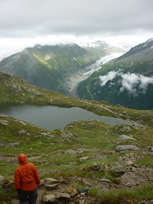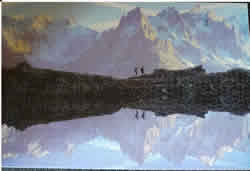
Friday 9th Sept, unpleasant weather, a breathless, heavy, humid morning, thick grey mist and cloud down to the rooftops across the valley. Think this dead air effect may be because the tail of another big storm (Hurricane Katia) is on its way. Birdsong again. I think the robins must have a late brood.
This post is in belated response to a comment from Alison Smith, about Mme de Stael, back in May. Alison, you mention P D James, Annie Lennox. I thought of Bianca Jagger, Arundjati Roy... But
Germaine de Stael wasn't exactly a human rights defender, or a lady of mercy, or an oustandingly charitable and righteous wealthy WAG. I think we have to shift up a few gears, and I think we have to accept she was no angel. She was (to paraphrase a famous description of Einstein's emotional and sexual behaviour) "a very normal woman". She was an old-fashioned establishment figure, whose novels were laden with convention: who had no problem with her privileges, who sought wealth and position; a lifelong Daddy's girl, who traded shamelessly on her feminine charms. Yet still, she commands my immense respect. There hasn't been a woman like her, operating on her level in world affairs, since she bowed out.
So let's imagine... Imagine the daughter of a hugely important, unimpeachably liberal and honest financial advisor to the White House, possibly Canadian or Mexican by birth; anyway, a bit of a foreigner. That would be, I think, the modern equivalent of Jacques Necker, Swiss financial minister to Louis XVI, who lit the fuse for the revolution of 1789. I'm scratching my head over a name, so, cut a long story short: imagine if Obama himself were thrown out of office, after providing the assist for a coup by the Progressives? They find him totally discredited. He's thrown so hard that he actually has to leave the USA, and goes into dignified retirement, with Michelle, in the Pacific somewhere not far from Hawaii. His only daughter, or his older daughter, say, has cunningly got herself married to somebody safe from the displeasure of the new regime (Germaine was married off at thirteen, to acquire a patent of nobility for the family, a prize she herself treasured all her life: the deal was decently conducted, the marriage wasn't consummated until she was eighteen). Anyway, Malia Ann, at first trading on her father's name, starts a blog. This blog, liberal, principled, outspoken, incredibly well connected and well informed, is a
total internet sensation. Nobody can shut her down, nobody can shut her up, she has friends on all sides, and shrugs of the occasional death threat. (Her best-selling books go platinum instantly, but they are just spin-off.) Everyone, every single member of our bizarrely varied C21 global High Society reads Malia Ann, from Hu Jintao to Victoria Beckham; from Shanghai to Sao Paulo, from Tehran to Los Angeles. From Mark Kermode to Angela Merkel. Even the Pope reads Malia-Ann: you just have to. He probably consults her when he's preparing his encyclicals.
It's important that she
looks like a simple woman of the people, of the Coming Race, but she isn't
really a peasant or a
sans culotte, so (be clear about this) she isn't threatening to the bankers and the Ministers, she just makes them want to be admired in her terms: not the terms of War is Profitable and Greed is Good... It's important that she has no office, and belongs to no party. Imagine what a counterweight she'd be to our feral elite: how they'd be dragged towards decency by her decent, liberal and humane voice. How they'd be held in check, instead of treating the world (as they do now) as their playground, and their blood-spattered larder.
It can't last. The Progressives, after a period of turmoil, finally throw up a new pretender for the throne of Leader of the World. He's nominally Progressive, like Obama before him, but soon he shows his fangs. He wants Malia Ann on his side, and she rather fancies the position of being his restraining guide, but it doesn't work out. When Malia Ann tries to get herself recruited as his Muse, he tells her the most celebrated woman should be the one who bears the most babies. So that's the end of that flirtation...and Malia-Ann becomes radicalised at last, and pays the price.
Anyway, I just wanted to explain what and who Germaine de Stael was, this barely-famous historical figure, so eclipsed now (as a writer) by, say, Mary Wollstonecraft Shelley. And the moral of the story is that I
can explain, now, because for the first time since her day a woman like Germaine makes sense. Conversation was her passion, and the medium of her power: and now, again, different technology, different scale, it's the conversation that matters, the unstoppable conversation that rules the world.
Other moral,
put not your trust in patriarchy. Not if you want to last.
Germaine died at 51, I think because she never recovered from a dangerously late pregnancy, but the story doesn't end there. It ends in a quietly well-heeled country house, many generations later, on another planet (as good as), with a soft spoken android guide, who really has no idea why Germaine was famous, except that she's one of the ancestors...
In Geneva again this July, we finally managed to make the visit to Coppet, the manor house to which Jacques Necker retired, when the French Revolutionary government no longer had a use for him, and which later became the HQ in exile of his redoubtable daughter. Listed among the Castles of Switzerland, Its actually a restrained C18th manor house, close to Nyons, on the shore of Lac Leman; still occupied by the present Comte de Haussonville, the property having descended through Germaine's daughter Albertine, duchesse de Broglie, and Albertine's daughter, Louise d'Haussonville. The rooms we saw, restored to what they were in Mme De Stael's time, are simple, stone tiled, cool and graceful. Aside from the inevitable family portraits, including a massive King Louis in white satin (sort of thing monarchs of the ancien regime used to hand out, as marks of great favour), it has the air of a slightly primitive country retreat, a place to rough it in comfort for the visitors from Paris. There's not much sign of Germaine's public and literary career. Our guide seemed mildly bemused when I bought the second volume of
D'Allemagne, (the book that made Napoleon so furious); the only copy in stock, from the gift shop. A guided visit to Coppet today is all about family, nobility; the honour of having been passed down in the same line for nine generations; romantic celebrity connections. Juliette (Mme Recamier) is the star among these, what a beautiful creature she was. And a true friend too.
 Saturday 15th October, fine and clear.
Saturday 15th October, fine and clear.
 Wednesday 12th October, weather same as yesterday, less cloud, more blue, quiet skies, still very mild.
Wednesday 12th October, weather same as yesterday, less cloud, more blue, quiet skies, still very mild. Tuesday 11th October, mild air, grey low sky, a thin, dropping rain. Frog action and birdsong.
Tuesday 11th October, mild air, grey low sky, a thin, dropping rain. Frog action and birdsong.

 Monday 3rd October, a cool breeze through my window, morning sun burning white in a clear sky, but it won't be so hot today as it's been over the weekend
Monday 3rd October, a cool breeze through my window, morning sun burning white in a clear sky, but it won't be so hot today as it's been over the weekend
 a wild weekend by the North Sea in March, how could I resist? People say they don't like winter, they hate grey November, January and February are the slough of despond. Couldn't disagree more. Summer summer summer, always some kind of hell.
a wild weekend by the North Sea in March, how could I resist? People say they don't like winter, they hate grey November, January and February are the slough of despond. Couldn't disagree more. Summer summer summer, always some kind of hell. Friday 9th Sept, unpleasant weather, a breathless, heavy, humid morning, thick grey mist and cloud down to the rooftops across the valley. Think this dead air effect may be because the tail of another big storm (Hurricane Katia) is on its way. Birdsong again. I think the robins must have a late brood.
Friday 9th Sept, unpleasant weather, a breathless, heavy, humid morning, thick grey mist and cloud down to the rooftops across the valley. Think this dead air effect may be because the tail of another big storm (Hurricane Katia) is on its way. Birdsong again. I think the robins must have a late brood. Thursday 8th September, cool and grey, glimpses of sun, the air outdoors heavy and humid, but no rain yet. The gale winds have died down completely now. There's been a bird singing, a robin I think, first birdsong in the garden for a long time.
Thursday 8th September, cool and grey, glimpses of sun, the air outdoors heavy and humid, but no rain yet. The gale winds have died down completely now. There's been a bird singing, a robin I think, first birdsong in the garden for a long time. jigsaw picture, sadly with zero co-operation from the weather around Mont Blanc. If you look carefully, you can see the glacier called the Mer du Glace, across the Chamonix valley, but of course no needles, and if there had been, they couldn't have been reflected in sunset or dawn light in the Cheserys lakelets. That would take very different timing. As it was, I was forced to pretend I was Tommy Voeckler, utterly determined to hang onto the yellow jersey one more time, to set a pace that got us back to La Flegere for the last telephorique down to the valley. One lives and learns. Next time, maybe.
jigsaw picture, sadly with zero co-operation from the weather around Mont Blanc. If you look carefully, you can see the glacier called the Mer du Glace, across the Chamonix valley, but of course no needles, and if there had been, they couldn't have been reflected in sunset or dawn light in the Cheserys lakelets. That would take very different timing. As it was, I was forced to pretend I was Tommy Voeckler, utterly determined to hang onto the yellow jersey one more time, to set a pace that got us back to La Flegere for the last telephorique down to the valley. One lives and learns. Next time, maybe.  On the last evening, me very footsore with the trouble that's going to ground me completely one of these years, we took a short stroll up a tiny, raspberry dangling path between the chalets of Les Mousseaux to find John Ruskin's stone: Ruskin placed here in honour by local worthies on a great medallion set in a granite boulder, wood sorrel and wild strawberries clustering around it, under steep forest trees: really like the grounds of Brantwood, oddly enough. Looking remarkably rugged, wild haired and Beethovian, I must say. 1925. He loved Chamonix, of course. He'd hate it now, but he'd be wrong to get too upset, it's just like Cumbria. You don't have to go very far, to leave the crowds. We were alone most of the time.
On the last evening, me very footsore with the trouble that's going to ground me completely one of these years, we took a short stroll up a tiny, raspberry dangling path between the chalets of Les Mousseaux to find John Ruskin's stone: Ruskin placed here in honour by local worthies on a great medallion set in a granite boulder, wood sorrel and wild strawberries clustering around it, under steep forest trees: really like the grounds of Brantwood, oddly enough. Looking remarkably rugged, wild haired and Beethovian, I must say. 1925. He loved Chamonix, of course. He'd hate it now, but he'd be wrong to get too upset, it's just like Cumbria. You don't have to go very far, to leave the crowds. We were alone most of the time.
 Monday we walked out in the evening, from Woodingdean along the Juggs Road track to Castle Hill, down through sheets of vivid rosebay willowherb and between walls of bramble to the flowers and butterflies in the combe, out the other end past the old lost damson orchard, up again over the hill & down the Bostle path and the lane into Rottingdean, under battalions of swifts to Kipling's garden and a sojourn at the Black Horse, which was rather gloomy and very quiet, and back along the undercliff walk. A very still evening, an old-gold three-quarter moon in a mist, the sea hardly making a sound, gracile black-headed gulls, (a pleasing change from the brutish herring gulls who have made Roundhill Crescent
Monday we walked out in the evening, from Woodingdean along the Juggs Road track to Castle Hill, down through sheets of vivid rosebay willowherb and between walls of bramble to the flowers and butterflies in the combe, out the other end past the old lost damson orchard, up again over the hill & down the Bostle path and the lane into Rottingdean, under battalions of swifts to Kipling's garden and a sojourn at the Black Horse, which was rather gloomy and very quiet, and back along the undercliff walk. A very still evening, an old-gold three-quarter moon in a mist, the sea hardly making a sound, gracile black-headed gulls, (a pleasing change from the brutish herring gulls who have made Roundhill Crescent  their clifftop colony), sleeping on the water, turned up at both ends The Tour is on the tv, the last two-legged tadpoles, four-legged tadpoles and mini-frogs have been released, the year is about to break in half, no long trip this time just a short holiday, Geneva and Chamonix where I hope to keep my promise to self and walk into my jigsaw picture of Les Aiguilles Rouges, but still, symbolically and from old habit this is the changeover, the end of my summer term.
their clifftop colony), sleeping on the water, turned up at both ends The Tour is on the tv, the last two-legged tadpoles, four-legged tadpoles and mini-frogs have been released, the year is about to break in half, no long trip this time just a short holiday, Geneva and Chamonix where I hope to keep my promise to self and walk into my jigsaw picture of Les Aiguilles Rouges, but still, symbolically and from old habit this is the changeover, the end of my summer term.  A mailing from Orion? Whoa, that's weird, what can it be? To be approached with caution, but it's okay, only the SFX team deciding to elect Ax Preston as one of their Summer Reading feature's sf heroes. I'm touched, SFX people, and to satisfy Ax's multitude of eager fans here's the great dictator's portrait by Bryan Talbot.
A mailing from Orion? Whoa, that's weird, what can it be? To be approached with caution, but it's okay, only the SFX team deciding to elect Ax Preston as one of their Summer Reading feature's sf heroes. I'm touched, SFX people, and to satisfy Ax's multitude of eager fans here's the great dictator's portrait by Bryan Talbot.  what I did there?) La Cristallisation de L'Ombre today. And pay my library fines, post my letters cancel the milk and all that. It's time to hit the road.
what I did there?) La Cristallisation de L'Ombre today. And pay my library fines, post my letters cancel the milk and all that. It's time to hit the road.